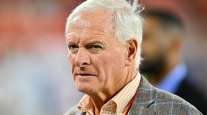Senior Reporter
Four Former Pilot Executives Set for Trial Oct. 31

More than four years after an FBI raid on the headquarters of Pilot Flying J, the exhaustive investigation into a diesel fuel rebate fraud could be nearing its end come Oct. 31.
That’s when Pilot’s former president, Mark Hazelwood, and three other former executives under indictment are set to go on trial in federal court in Chattanooga, Tenn.
That is, unless federal prosecutors have plans to continue their investigation further up Pilot’s corporate ladder.

Haslam by David Richard/AP
CEO Jimmy Haslam has not been accused in the multimillion dollar rebate scheme despite being named in a 2013 FBI search warrant affidavit as participating in sales meetings during which the scheme was discussed.
Haslam, brother of Tennessee Republican Gov. Bill Haslam and owner of the National Football League’s Cleveland Browns, has denied involvement in, or knowledge of, the multimillion dollar conspiracy to cheat motor carriers out of diesel fuel purchase rebates.
A Pilot spokeswoman declined comment for this story.
So far, federal prosecutors have been mum on their ultimate intentions whether to pursue future charges. However, a total of 14 former Pilot sales executives have previously been charged, pleaded guilty and agreed to cooperate with the government while awaiting sentencing.
Hazelwood and seven other Pilot executives were charged in February 2016, accused of playing a role in a scheme to cut motor carriers short of rebates the company had promised for purchasing diesel fuel. Hazelwood and three other executives have pleaded not guilty, but in July, four other executives pleaded guilty.
In his plea agreement filed last month, John “Stick” Freeman, a former national sales vice president for Pilot credited with being the architect of the fraud, said he and those who reported directly to him cheated customers out of $7 million to $9.5 million in rebates.
He and others in the sales division referred to handpicked customers who were defrauded as “Customer B” trucking companies, and called the conspiracy “Manuel,” Freeman said.
Knoxville criminal defense attorney Dennis Francis, who has closely watched the Pilot case, said that defendants who plead guilty and cooperate with the government can have their sentences significantly shortened if they offer “substantial assistance” to the prosecution.
“We call it getting on the bus,” Francis said. “If you’re charged, your lawyer will say we don’t need to be just sitting on the bus, we need to be driving the bus.” Many of the former executives face up to 20 years in prison.
“In my opinion, one or more of the remaining four will enter a plea agreement, or maybe they already have and the plea is sealed,” Francis added.

John Sommers II for Transport Topics
The Pilot case began with a dramatic raid on the company’s headquarters in Knoxville, Tenn. With military precision, more than 50 FBI and IRS agents poured into the company’s three-story offices on the afternoon of April 15, 2013. Not only were they planning to search for records and computer files, they also had plans to quickly isolate 14 key Pilot executives for interviews with a total of 28 agents.
After the agents secured the building and began their search, a seven-member special federal “taint team” looked on to ensure that any of the documents agents obtained or viewed were not confidential or privileged.
Some of those interviews the day of the raid, although given voluntarily, have been unsuccessfully challenged in recent months by defense attorneys who claimed the interviews were not valid because FBI agents did not give executives Miranda warnings.
Pilot already has paid the federal government a $92 million penalty to take responsibility for the criminal actions of employees who shortchanged trucking companies on their diesel fuel rebates, but the agreement did not preclude individual prosecutions.
Also, in November 2013, a federal judge in Arkansas approved an $84.9 million settlement offer from Pilot to reimburse as many as 5,500 customers included in a class-action lawsuit against the company.


